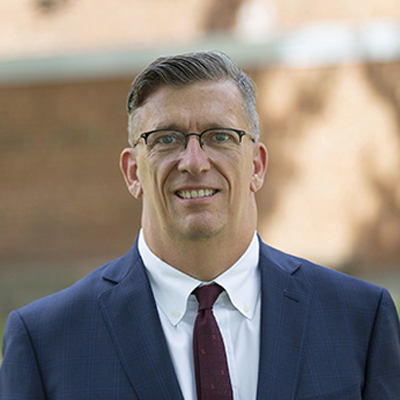
Robert Brinkmann, one of four candidates vying to become UW Oshkosh’s next chancellor, said that developing the university’s curriculum and student experience is essential to better integrate UWO for everyone during an April 10 open forum.
“The world is changing all around us, and we need to do a better job developing curriculum that matters to our students and matters to the community,” he said.
Andrew Leavitt, who has served as UWO’s chancellor since Fall 2014, will be stepping down after this semester.
A pool of candidates was reduced to four individuals — Brinkmann, Manohar Singh, Joe Whitehead Jr. and Amy Hietapelto — all of whom spoke during multiple forums throughout the week.
Articles for every candidate can be found at advancetitan.com.
Brinkmann said that the alumni situation of Northern Illinois University (NIU), where he currently resides as the dean of the College of Liberal Arts and Sciences, is very similar to that of UWO, and he can help leverage fundraising and support for the university.
“The last five years, we’ve raised over $25 million, and that’s around what [UWO’s] endowment is,” he said. “I think that we can really increase that. … I know how to engage with alums; I know how to build a fundraising team.”
Brinkmann said that improving the status of UWO, both financially and for all of its stakeholders, involves strategic planning. He said he has a strong focus and belief in strategic planning, which for him involves getting feedback from all stakeholders — students, staff and faculty — holding listening sessions and events, dividing up roles and holding everyone responsible.
This, he said, has direct impacts on fundraising and budgeting, which is especially crucial at a private institution like Hofstra, where he worked as a vice provost and dean prior to NIU.
“As a private university, we have to land the plane perfectly,” he said. “We can’t be over. … So we were really very careful about our budgeting throughout all of my time there.”
This translated well to his job at NIU, he said, which has a financial deficit between $17 million and $24 million.
“The president asked me, one of the first years I was there, to be part of a three-person group to develop a plan for how to deal with that deficit,” he said. “We spent a year looking at the budget, as well as working with all of the stakeholders across campus to try to develop appropriate planning for how to deal with the deficit.”
He said his team produced a report at the end of that year that has been adopted and worked on by the president.
Taking the steps to push beyond structural deficit issues, Brinkmann said, is crucial so that a university can move forward positively and craft a vision of itself.
“Budgeting is not accounting in that budgeting is really an expression of your values as an institution,” he said. “You build your budget based on what you want to do and what your aspirations are to do. The accounting is what you have at the end of that, and it tells the story of whether or not you were able to achieve your goals through the budgeting work you did in planning for the year ahead. I think it’s really important to be intentional with strategic planning to make sure that you build a budget that makes sense for where you want to go as an institution.”
“We want to keep all the students that come to NIU and make sure that they graduate,” he said. “We don’t want to lose anyone.”
He said there are a number of ways to make this happen, including supporting students through student success initiatives.
At NIU, Brinkmann said he helped build a math assistance center, support for English classes and other more difficult general education curriculums, as well as other funds to help students pay their bills.
“We found that there are about 300 students each year that drop out at the junior or senior level because they’re unable to pay their bills,” he said. “We found out that the average bill they had to pay was around $600. So we’ve done a lot of work with philanthropy to keep those students in by asking our alums to help students, and we’ve raised hundreds of thousands of dollars toward that program.”
Additionally, he said that improving the college experience for adult learners is key.
“A lot of students leave school and they don’t come back, and we don’t give enough opportunities for them to come back,” he said. “They don’t want the same entry point as traditional-aged students. … We have to find ways to reach adult learners where they’re at, and also with programs that matter to them.”
He said that he has helped put forward a general studies degree, which is aimed to help individuals whose jobs simply require a college degree.
He has also helped facilitate a process where police officers and firefighters can get degrees in public service leadership, as well as trying to better connect with the community broadly.
Brinkmann said he doesn’t only have experience engaging with the community but also with public officials, which he developed working with state governments during his time at Hofstra University in New York City. It was during this time that the great recession of 2008 began.
“I was asked to be part of the economic development planning team for Long Island,” he said. “We had to work with a team to develop planning around economic development to drive the economy forward. … We helped bring millions and millions of dollars of investments to Long Island.”
He said they focused on rebuilding industries in Long Island around sustainability, which included industries transporting and storing food on the island.
“That was a wonderful experience to build that connection with the university, with the private sector and the public sector with the state hopping in,” he said. “We also funded a number of non-profit organizations that were also key to the success of the economy on Long Island.”
Brinkmann said he has a lot of experience working with governmental agencies and congresspeople, which he can bring to the university.
“I know how to work with state organizations,” he said. “I know how to work with federal organizations, local governments to try to enhance support for the university’s initiatives. … I’d be happy to bring that as chancellor here at UWO.”
Brinkmann currently serves as the dean of the College of Liberal Arts and Sciences at NIU and as a professor of Earth, Atmosphere and Environment.
Previously, he was the Vice Provost for Research and dean of Graduate Studies at Hofstra University.
Brinkmann also served in various roles, from professor to associate dean, at the University of South Florida.
He earned his bachelor’s degree in geology from UWO, his master’s degree in geology from UW-Milwaukee and his Ph.D. in geography from UW-Milwaukee.
He has also authored several books on sustainability and the Earth sciences.
Brinkmann’s full CV can be found at uwosh.edu/chancellor/wp-content/uploads/sites/69/2025/04/Brinkmann-Robert-CV.pdf.









